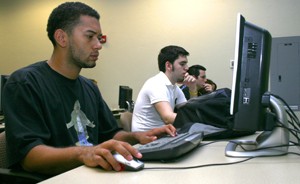The Love Bug, My Doom, Detnat, Money Tree and the Bagel. These are not types of cars, video games, the newest flavor at Starbucks or a morning breakfast. They are the vehicles of thievery and deception, capable of gathering information, monitoring activity and destroying vital data.
The worst part is you may already have one and never even know it.
With the semester barely a few weeks old, nearly every UA student has received an e-mail warning of phishing attempts asking for a Net ID and password.
“”A legit e-mail, like our webmail, is never going to ask to reply or respond with that type of confidential info,”” said Kelley Bogart, UA’s senior information security specialist. “”We own that information. So you’re never going to get an e-mail to reply to and have to give that type of info.”” she said.
She advises students and staff to use caution when data such as password or financial records are requested. Bogart admits one of the reasons it is nearly impossible to pinpoint a particular type of virus and scan e-mails for it is due to their complexity.
“”They morph and they change … so it really is on the end users onus on the most part… We’re very trusting,”” she said. “”That’s what this social engineering is about. The trust factor the human factor.””
Although viruses come cloaked, there are points to look for when you suspect an e-mail may not be legitimate.
“”A safe practice for users is to never click on any link in any e-mail.”” She advises students go to the Arizona webpage and search for the NetID website, then enter that address in a separate browser window.
Another item to be cautious of is the grammar.
“”That can be a key thing to hone in on, because (many) of the people doing this, English is not their first language,”” Bogart said. “”So you’re going to see grammar and spelling (errors).””
Wireless has become very trendy on college campuses, yet it too is a potential danger.
“”If you don’t have to configure or type in a password, then you’re on an unsecure wireless (network), which means your info is basically in the air and anyone sitting next to you (can) grab and capture your info as it’s going through the air,”” Bogart said.
For those who felt they may have a virus or have replied to one of these e-mails, there are contingencies in place.
“”Once a suspected email has been found, several things are done: we forward a copy of suspected e-mails to postmaster, who then monitors traffic to and from accounts,”” Bogart said. “”Then we cut off their NetID, because you probably just divulged information you probably didn’t want to.””
The Office of Student Computing Resources is another route UA students can follow to solve nearly any type of computing problem, from hardware to ensuring the computer is running smoothly.
The main OSCR office is located in the Martin Luther King, Jr., Student Center, at 1322 E First St., in room 207. Hours of operation are from 9 a.m. to 11 p.m. on weekdays. An appointment will not be required for the first three weeks of the semester. After that, it will be necessary to schedule an appointment for any type of work done. If assistance is needed after business hours, UA students can also get 24/7 technical support via phone.
“”It’s always manned,”” said Christopher Habeeb-Louks, a technical support assistant. “”They will help people with any computer problem. I’ve had people referred over there because someone locked her laptop to her bed post. One guy wanted to set up his Playstation 3 via wifi and stuff like that.””
UA students also get the benefit of receiving discounted programs, such as anti-virus software.
“”The UA has a licensing where they pay for licensing of programs, and as a student, you can download certain things for free or at a cheaper price,”” Habeeb-Louks said.
Yet all this information is worthless if layers of defense are not put in place.
“”Students need to understand the threats are out there. I think the number one thing people think is, ‘I’m just one person, who would care about me?’…But times are changing, and bad guys are hitting personal computers,”” Bogart said. “”If I’m a bad guy, I’m going to find so many openings; if I run across a person who has a couple layers of defense against me, I’m going to move on.””









